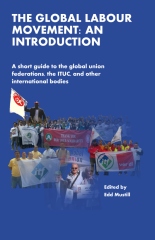
The latest book from LabourStart
Publication date: October 2013
Order your copy now
CreateSpace
Powells.com Unionized bookshop
Barnes & Noble
Amazon.com
Amazon.co.uk
Amazon.ca
Amazon.de
Amazon.fr
Other bookshops - coming soon
Kindle edition - Amazon.com - only $0.99!
Kindle edition - Amazon.co.uk only £0.77!
All proceeds from the sale of this book go to support LabourStart's campaigning activities.
Check out our first two LabourStart books:


The authors | Contents | Sample chapter | New! Reviews
Everything is changing has changed.
Mozilla has now announced that Firefox OS is no longer being supported or developed.
Update - December 2015: Because of this development, LabourStart is no longer promoting the sale of this book. Firefox OS was a good idea, but like many good technologies, it proved to be unable to compete with bigger and better-funded competitors like Apple (iOS) and Google (Android)
Smartphones and tablets are increasingly the way people access the net.
But are trade unions and other civil society groups ready for the change?
In this short book, Eric Lee and Jeremy Green look at the Apple/Google “duopoly”, the problem of privacy, and the costs of app development – and what this all means for social change activists.
They explore not only Firefox OS, the new open source mobile operating system, but also the emerging alternatives – Ubuntu Touch, Tizen and Sailfish.
They even get a look at the world's first “ethical” mobile device – the Fairphone.
About the authors
Eric Lee is the founding editor of LabourStart, the news and campaigning website of the international trade union movement. His 1996 book, The Labour Movement and the Internet, was considered a pioneering exploration of how the new communications technologies can help fuel social change.
Jeremy Green is a Principal Analyst at Ovum, the leading research and analysis company, based in London. He writes here in a personal capacity.
Contents
- Introduction
- The problem
- The rise of the smartphone
- Smartphones are part of a closed ecosystem
- Web apps as an alternative
- The Duopoly
- Who's afraid of the duopoly?
- The phones are part of the problem
- Fairphone
- Open Source and Free Software
- Meet Firefox OS
- Cheaper phones, easy app creation and privacy
- The Mozilla Foundation
- Cheaper apps
- Software diversity is a good thing
- Ease of app creation
- Privacy matters
- What could possibly go wrong?
- Open source alternatives to Firefox OS
- Sailfish
- Tizen
- Ubuntu
- Android Mods
- Conclusion
- What now?
Sample chapter:
Fairphone
Fairphone is a Dutch initiative to create an alternative to the decidedly “unfair” phones that are being made and sold today. It began life as a campaign and transformed itself into a company to actually make phones in a better way.
Its phone, which can already be pre-ordered online, is in many ways an improvement upon the mass-manufactured phones most of us carry around today.
Those phones are usually made with little or no concern for the environment or the well-being of the workers who make them.
Fairphone, on the other hand, aims to use “fair and confict-free resources”, is committed to environmentally-friendly solutions to the problem of e-waste, and has given the phone an “open design”. It promotes repairabiilty, and replacement components for almost everything are intended to be available to enable this (along with instruction manuals).
All good, but when it comes to who actually makes the phone, we run into some problems.
Originally, it seems, Fairphone aimed to find a manufacturing partner in Europe, but gave up and selected contract manufacturer A'Hong, which has factories in Shenzen and Chongqing.
It says “Fairphone intends to manufacture in China because ... we feel our model can make a difference in improving working conditions and environmental impacts in China”.
Fairphone says that in China it is committed to “creating a fund to improve worker’s wages and working conditions and open discussions between workers and their employers”. It also promises to publish an audit report of working conditions in its partner's factory.
It has partnered with “an independent, third-party social assessment organization to perform an assessment”. The partner, TAOS Network, comes from the world of 'corporate social responsibility', and its union credentials are to say the least thin.
In our discussions with the company we found a good understanding of the limits of third-party monitoring and a willingness to work towards something better for workers. It is placing its hopes on its ability to strike a new kind of supply contract, with longer terms relationships and less emphasis on lowest costs; and it hopes that some of the benefits of this can be shared with the workforce.
We understand that it is negotiating from a position that is not strong, as a newly formed company with no track record or sales figures, and with a production run of 25,000 phones that amounts to three weeks' manufacturing.
To be fair to FairPhone, proper European manufacturing is no longer really an option, because the entire supply chain has moved to Asia, and 'making' a phone in Europe would just mean final assemby from Asian-made components.
But why choose a low-wage country that also happens to be completely union-free? Asia is full of countries that have low-wage workforces, but where there are unions that at least try to organise and represent those workers.
China is surrounded by such countries, any one of which (except North Korea) has a better record on workers' rights. Workers don't need “independent third-party social assessment organizations” and they don't need “open discussions” with their bosses. They need proper representation through free trade unions, not a company-run staff association and fund.
Fairphone admits that it didn't look at all the possible manufacturing options; as a small company with limited resources that's not so surprising, though it is still disappointing.
The people behind Fairphone are clearly well-intentioned and want to make the world a better place. The company website says “We support and actively promote the ILO conventions enshrining freedom of association and collective bargaining and we feel that in absence of this little change will happen in the mines or the factory floor.”
But by opting for non-union manufacture in China, and trying to placate critics with sops like “social assessment” and “open discussion”, it is pushing the serious issues into the future.
We hope that Fairphone will deepen its commitment freedom of association so as to ensure that all of its phones are made in factories where workers are free to join proper, independent trade unions, even if it can't deliver on this right now. A truly fair FairPhone would carry the one label that really mattered: a union label.
Reviews
If you are a reviewer and would like us to send you a copy of the book, please email ericlee@labourstart.org.
Stuart C. Elliott - Amazon.com
This short information-packed book is essential reading for union and social change activists. Unions and community groups have embraced social media, but there is a big change underway in how people use social media and the web in general. The rise of smart phones is a new challenge for change communicators. Lee and Green make a convincing case that unions and others should actively use the Firefox OS and open-source software. Some important books you read once and mark a few key passages, if you are involved in change communications this is one you'll read and study often. If you do, there's a good chance you and your group will be ahead of the curve.